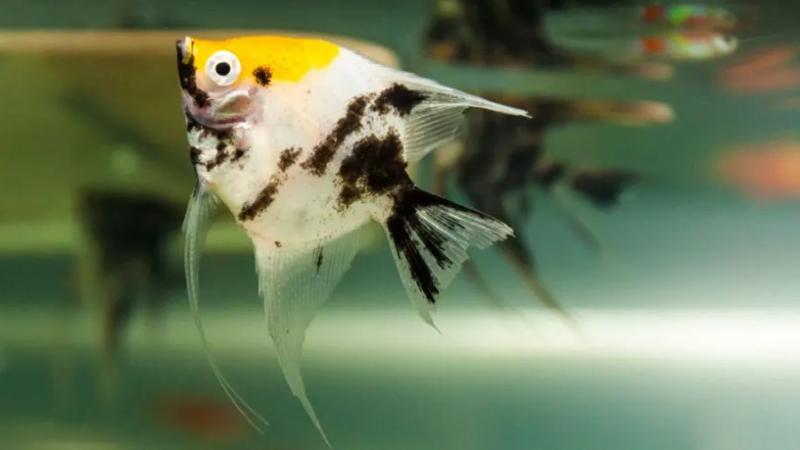You can keep angelfish in any area of your aquarium to keep them for a long period of time. Have you wondered that do angelfish jump?
Nevertheless, I was wondering to what extent the Angelfish jump out of the tanks when they are threatened or not. This prompted me to do some research, which led me to read some interesting facts about the Angelfish.
Angelfish jump out of tanks sometimes, but are they really able to do that? The short answer is yes, they are able to do that.
This is not an everyday occurrence, however. In the majority of cases, if the fish are healthy and happy, they may remain in the tank for a long period of time.
It is not uncommon for fish to jump out of a tank if the water inside gets dirty, or the tank becomes too toxic with nitrates and ammonia, or if they feel any danger.
Aside from these important reasons, a few more things can cause your Angelfish to jump out.
The following reasons should be considered if you have ever faced a similar situation or decided to become a pet Angelfish owner, as this list will hopefully prove useful to you in the future.
Related Articles
- Do Angelfish Like To Hide? 7 Reasons Will Answer All Your Wonders
- Do Angelfish Get Lonely? – 3 Things You Need To Know
- Do Angelfish Fight And 6 Ways To Make Them Stop Fighting With Others
- Freshwater Angelfish Fundamentals – Care Guide: Lifespan, Size, Diet, Habitat & More
Are There Any Specific Reasons Why Angelfish Jump Out Of Their Tanks?
Angelfish might jump out of the water for a variety of reasons. One of them is that they like to eat.
Some of these factors are lacking oxygen, unstable temperatures, a lack of hiding places, fear factors, bullying or fighting, and toxic water.
Contaminated Water
It has been found that angelfish have quite a high sensitivity when it comes to the water quality of their aquariums.
In water that contains nitrites, ammonia, and nitrates, they might jump out if there is a high level of these elements.
For the most part, if the water condition of your tank is not ideal, it can result in your sweet Angelfish leaving the tank in search of a better environment.
In spite of their extremely toxic nature, ammonia and nitrites have the ability to make even small percentages of fish sick and potentially kill them.
As well as causing your Angelfish harm, high levels of nitrates can also negatively affect their health.
Oxygen Deficiency
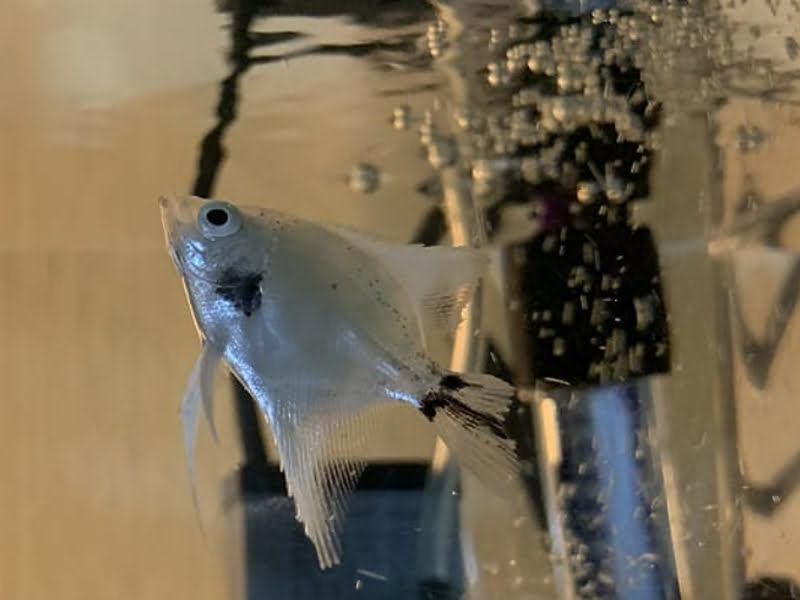
There is also the possibility that dissolved oxygen can be lacking in your aquarium water, another reason why Angelfish jump out.
In spite of the fact that nearly all fish lack lungs that would allow them to breathe oxygen directly from the air, they do require oxygen dissolved in the water to breathe properly.
Your Angelfish might be trying to jump out of the water if it cannot breathe oxygen, in the hope that it will find a place where there is more soluble oxygen in the water.
The fact that there is not enough oxygen present in a tank is the reason why the fish will fight for the oxygen that they need.
Another issue that needs to be resolved is algae. There is often nothing left for the fish to breathe because they have been consuming so much dissolved oxygen as a result.
Temperatures That Fluctuate
Just like any other fish, angelfish require a certain temperature to survive, just like all other aquatic creatures.
It is also not surprising that they are quite sensitive to changes in water temperatures.
If cold or hot water is present in the aquarium, your angelfish may be encouraged to jump out because of the extreme temperatures.
Frightening Factors
New fishes in the tank tend to be the most affected by this. There is a period of adjustment for a new fish to the new environment which can take some time. Therefore, you may observe some changes in your angelfish in the early stages.
You can also startle your fish if there are sudden light flashes or bright lights. There is a possibility that your fish will jump out of its tank if there is anything new or unexpected such as your shadow.
You can also try turning on the lights in your room when your aquarium does not have any lighting fixtures so that your Angelfish is not scared.
Insufficient Hiding Places
In this very rare case, your Angel may jump out from the wall, and it is a difficult circumstance to prove, but it is still possible.
The least space they have in a small tank will not be sufficient if there are too many fish living in it.
Angelfishes typically need at least 10 gallons of water in their tank according to the rule of thumb.
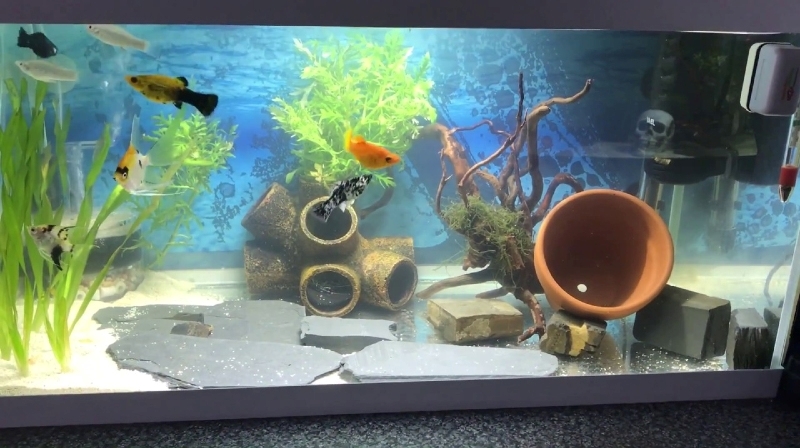
When this does not happen, they will feel cramped and may be tempted to escape to a more comfortable setting.
I’d like to stress the fact that if your fish do not get along, then if they find themselves surrounded by a large or aggressive fish, then they may need a place to hide.
Because there are no hiding places for threatened angelfish in the water, such as caves or plants, they may try to leave.
Combative Behavior Or Bullying
In fact, we may as well face the fact that even if you provide the best living conditions for your Angelfish, there must still be some form of internal competition that takes place.
Angelfish usually stay quiet and don’t show aggression. Having said that, they can become aggressive under certain circumstances.
Anemone fish are incredibly territorial fish and, as a matter of fact, have even been known to fight other fish species to establish their territory.
If your Angelfish continues to fight, eventually you will find yourself in a mess sooner than you probably expected.
When a losing fish is attacked or bullied, he may not have an option but to jump out of the tank to ease his pain.
The Best Way To Stop Your Angelfish From Jumping Out of the Tank?
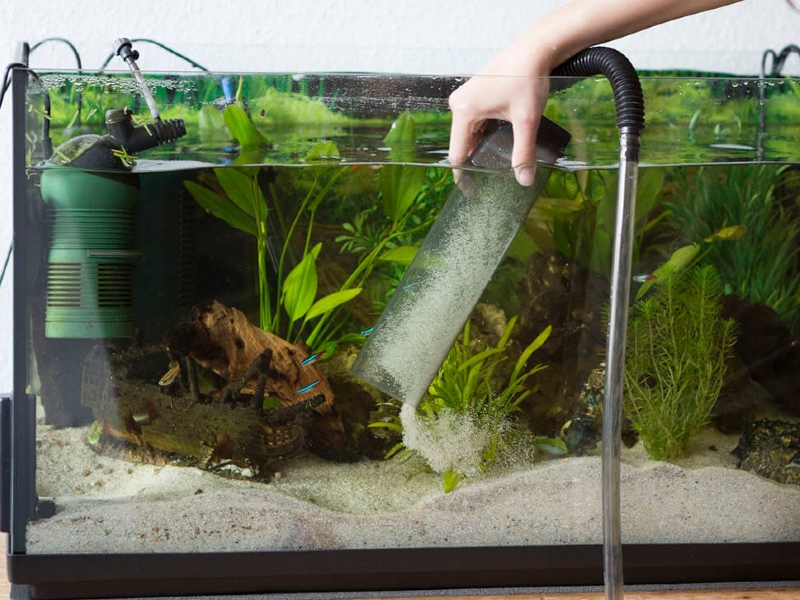
Maintain A Clean Water Supply
A lot of waste can be produced by angelfish since they are a bit aggressive eaters.
There are many things that can cause the ammonia levels to increase dramatically such as decaying fish waste, plants, uneaten food, and dead fish.
In order to ensure your fish are protected and to keep them at a safe level, you need to maintain the recommended levels of ammonia, nitrite, and nitrate.
It is in the best interests of the plants to have no nitrite or ammonia in the soil. As well, the nitrate level in the water must range between 5 and 10 parts per million. If it is greater than this level, angelfish could become poisonous.
Furthermore, make sure that you change the water regularly, but do not overdo it.
If you frequently switch the water, your angelfish will grow aggressive as they use their waste to mark their territory.
Ideally, to keep the Angelfish healthy and your aquarium water clean, you should change the water 20-25% two or three times a week.
The Tank Needs To Be Covered
You can prevent your Angelfish from jumping out of the tank by covering the tank. In this case, it would be helpful to get a hood that fits your tank, as this would solve the problem.
You should always choose a mesh or screen lid rather than a solid lid if you have any lighting system present.
The Angel won’t be able to jump out during this time, and the light will pass through this lens.
If you want to cover your tank with plexiglass instead of glass, that could be a great option as well.
Aquarium Plants Should Be Used
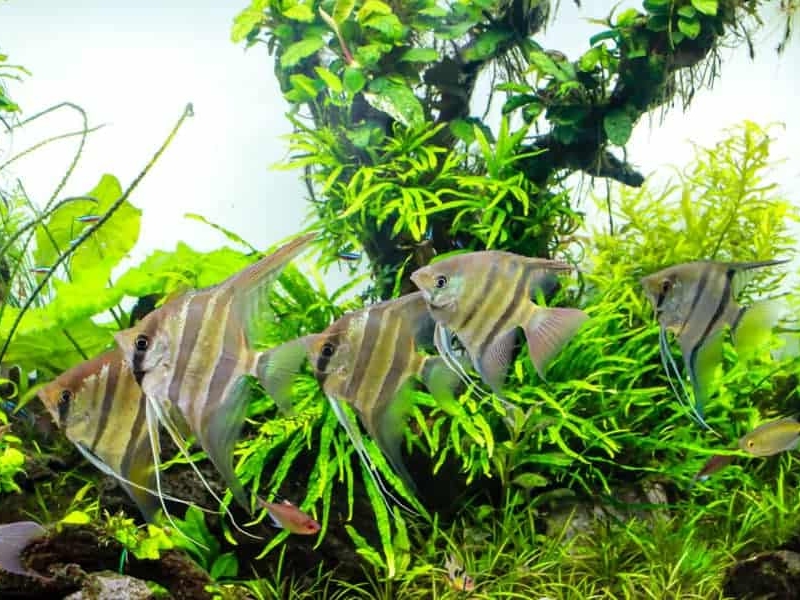
If you want to prevent your angelfish from jumping out of your tank, you can make use of floating aquarium plants in the tank.
Aquatic plants, such as floating plants, allow your aquarium to enjoy the natural shade.
Fish take comfort in floating near plants as they feel as if they are more connected to nature, and they don’t tend to jump when they’ve got a plant hovering over them.
In addition to adding a stunning visual style to your aquarium, they can also help you to maintain it better.
As these plants act as a natural air circulation system, it is a great method for adding oxygen to the environment.
As a result, your tank will have more oxygen in the future, which will go a long way toward the health and happiness of your Angels. As an added benefit, they also remove water toxins.
There are numerous floating plants available for Angelfish, such as Duckweed and Amazon Frogbit. Additionally, duckweed is also known to be effective in clearing algae out of ponds.
Stay Away From Overcrowding
In order to prevent overcrowding in the tank, please try to have fewer fish in it. Furthermore, you may also wish to purchase a bigger tank for the fish.
If you want, you could pair your Angelfish with less aggressive fishes, like, Catfishes, Bolivian Rams, Platies, and other less aggressive breeds.
This would mean less fighting and bullying between your Angelfish and the other fishes in your tank.
Moreover, you must ensure that you have as many hiding spots as you can for the fish, such as plants and caves.
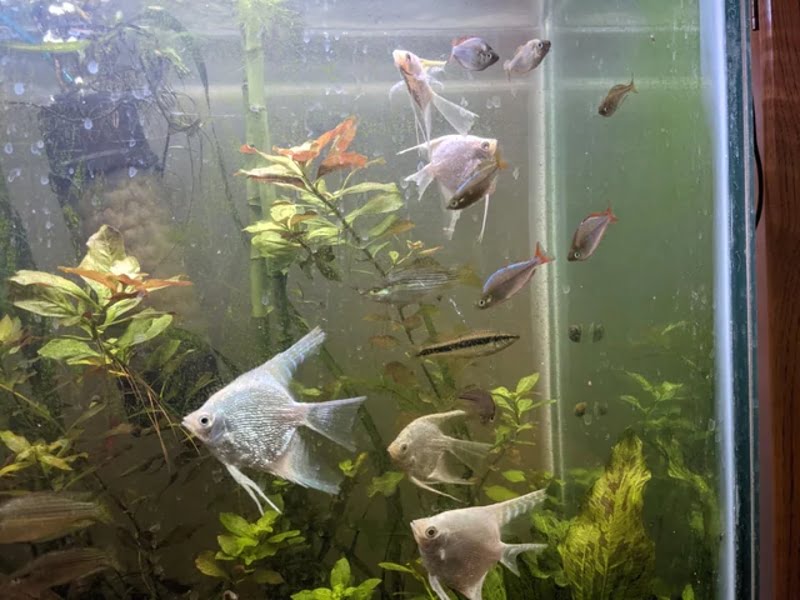
Keep The Oxygen Level And Temperature At An Optimal Level
According to my previous statements, Angelfish are sensitive to temperatures that are too warm or too cold.
In order to keep your Angelfish happy, it is critical that you maintain the correct temperature.
A temperature of 76 to 82 degrees Fahrenheit (24.44 to 27.8 degrees Celsius) would be ideal. If breeding is your purpose, the temperature may vary depending on that purpose.
As long as the temperature is between 76-78 °F, an angelfish that is not reproducing will be able to survive.
In general, a temperature of 80°F is considered to be optimum for a breeding Angelfish.
Furthermore, you also have to maintain the level of oxygen in the aquarium so that it can provide the fish with plenty of oxygen so that they can breathe properly. There is a way of increasing the level of dissolved oxygen in the water by adding air stones over the top.
Can You Rescue Your Angelfish If It Jumps Out?
It will be prudent for you to check whether or not your fish is alive as soon as you detect it. You should return the fish to its tank if it is alive.
In the event that you were able to spot your fish immediately after jumping, you should be okay. In fact, if you haven’t heard from your Angel in quite some time, it might be difficult to predict whether or not they will return.
In order to save the aquaculture aquarium, you will need to transfer it to a hospital tank that is clean and calm. The tank needs time for it to recover and for you to watch how well it is doing.
While you wait for the Angelfish to make a break for it, you should inspect your aquarium to find out what was causing him to run away in the first place.
Before you transfer your Angelfish into the main tank, it would be a good idea to get a lid for your tank if there are no obvious problems.
The next thing you should do is to check if your Angelfish is damaged. It is possible that your fish might have wounds after making a jump after a fight; therefore, you should treat those wounds immediately.
Using an all-natural antibacterial treatment may be a great way for you to speed up the healing process for your Angel.
A little temperature increase may also help your Angel speed up her healing process.
Their immune systems are strengthened by a higher temperature, which doubles up as protection against any infections they might get after they’ve had a wound.
Video About Do Angelfish Jump Out Of The Tank

Annette M. Chaney is an experienced marine biologist with over 20 years of experience as an aquarist and fishkeeper. She started her first aquarium at a young age, filling it with frogs and goldfish obtained from the ten-cent pet store.
Annette grew up caring for and breeding African Cichlids, which led to a hobby in high school that doubled as a profitable means. Attending Reed College gave her time to solidify herself as an accomplished aquarium caretaker with an eye for sales. After that, from 2009 – 2013, she studied at Roger Williams University – one of the most prestigious universities for Aquaculture and Aquarium in USA. She is the founder of AquariumCircle since 2010.
